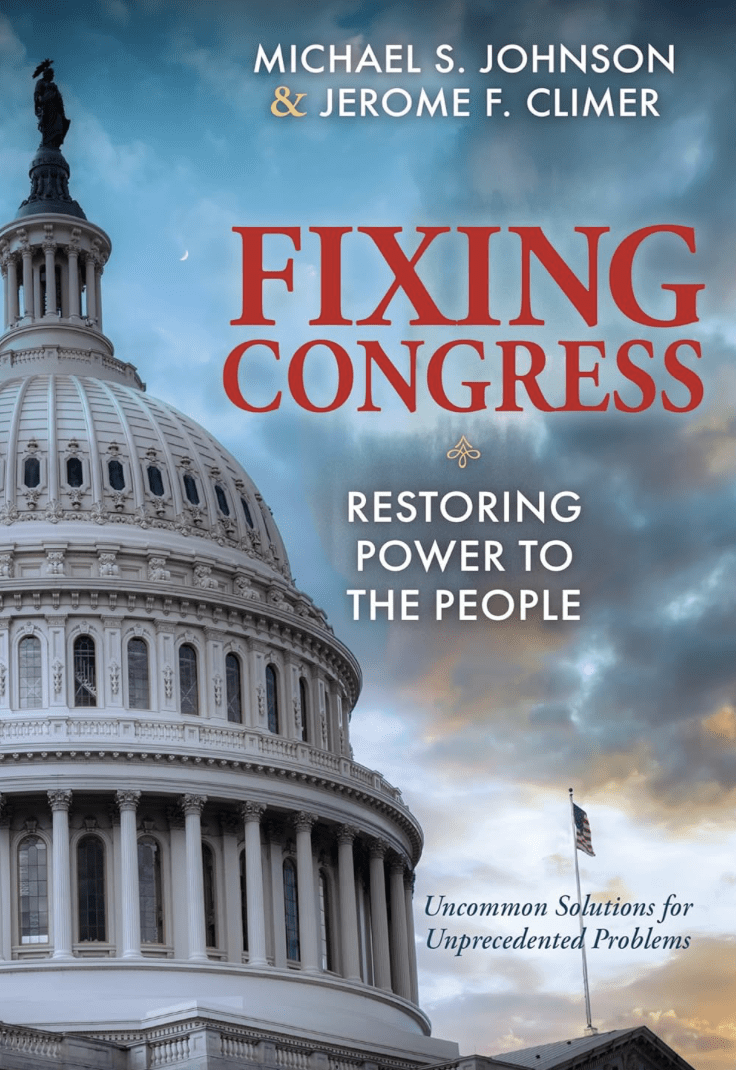‘Fixing Congress’: A Prescription for Wrestling Order from Chaos

Fixing Congress: Restoring Power to the People
By Michael S. Johnson and Jerome F. Climer
Morgan James Publishing/March 2024
Reviewed by Don Newman
May 6, 2024
As both Canadian and American readers will recall, it famously took fifteen roll call votes spread over five days in January 2023 for the United States House of Representatives to elect a speaker.
After Rep. Kevin McCarthy of California finally secured the title, he lasted only 10 months in the job. A deal McCarthy had made with the far-right Republican “Freedom Caucus” in exchange for their support ultimately led to his removal via a motion to vacate filed by a single member of the House. It took three more weeks of back-room manoeuvring before a successor, Rep. Mike Johnson of Louisiana, was chosen. Now, Johnson, too, is facing attempts to replace him by some right-wing members of his own party.
Unlike in Canada, with its British parliamentary system, the speaker of the US House of Representatives has real power. To start with, under the U.S. Constitution, the speaker of the House is second in line to the presidency, superseded only by the vice president. Which is why House speakers from Tip O’Neill to John Boehner to Nancy Pelosi have been household names not just in America but around the world, including Canada.
While many of the topics the authors discuss are specific to the more freewheeling American system, some U.S. trends resonate in Canada, along with the realization that what begins south of the border often migrates north.
The turmoil, backstabbing and dysfunction surrounding the speakership these days is a symptom of something terribly wrong. Clearly, Congress is broken. A large part of the blame for that goes to the Trump-ified Republican Party and its democracy disruption tactics. But for many years, Americans have been losing trust in institutions generally, and Congress has not been immune from that trend.
The new book Fixing Congress: Restoring Power to the People, by Michael S. Johnson (not to be confused with his namesake in the House speaker’s chair) and Jerome F. Climer, offers what the authors call “uncommon solutions to unprecedented problems.”
Both Johnson and Climer are long-time political staffers with deep experience in the workings of the congressional and executive branches of government. Their book is a tour-de-force primer on how power in the congressional branch works: how some chiefs of staff to committee chairs in the House and Senate wield more behind-the-scenes power than their bosses; how the “mighty media” wield power to influence public opinion and through that what Congress is doing (although that power has been diluted by the growth of special-interest blogs and podcasts); and, how swarms of lobbyists occupy the Capitol daily in order to influence individual members’ votes on issues of interest to their various clients.
While many of the topics the authors discuss are specific to the more freewheeling American congressional system, some U.S. trends resonate in Canada, along with the realization that what begins south of the border often migrates north.
The authors call for a variety of changes to make Congress work more effectively. They include: civics education, structural reform of congress, reducing the influence of outside interests, restoring civility to public discourse, and citizen engagement.
They also call for the return of a more bipartisan approach to governing. We hear the same calls in Canada. But in the age of Donald Trump, propaganda protests and polarized public opinion, that seems to be asking a lot.
Perhaps the most effective approach for all these problems is the authors’ call for voters to be better citizens. To inform themselves on the issues, question ideas and programs and not slavishly follow a political party’s agenda because that’s the party they have followed before. That is good advice in any country, and it could go a long way to fixing a lot of things, not just the United States Congress.
Policy contributing writer and columnist Don Newman, an officer of the Order of Canada and Lifetime Member of the Parliamentary Press Gallery, is Executive Vice President of Rubicon Strategy, based in Ottawa. He spent seven years in Washington with CBC News and CTV News covering the White House and Congress.
